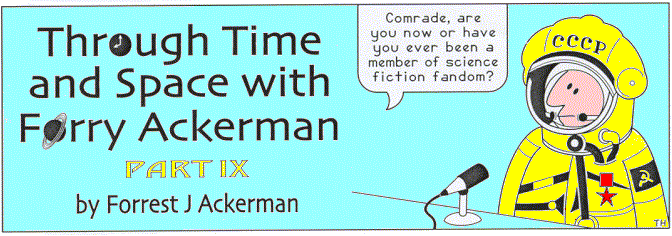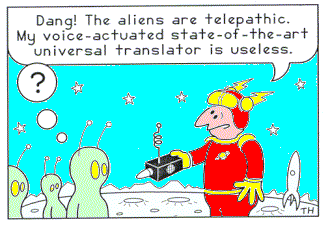 It's a bit paradoxical, but science fiction fandom is both old and young. As of
next year, fandom will have existed in *nine* different decades. And yet the
activity is new enough that there are still many active fans whose presence in
fandom spans the range from the present all the way back to its very earliest days.
The writer of the next article is one of them. In his previous article, Forry wrote
about some of those early days. This time he takes us on a trip to some far-off
lands in Europe and Asia, replete with visual wonders, cultural challenges, and even
some communication difficulties.
It's a bit paradoxical, but science fiction fandom is both old and young. As of
next year, fandom will have existed in *nine* different decades. And yet the
activity is new enough that there are still many active fans whose presence in
fandom spans the range from the present all the way back to its very earliest days.
The writer of the next article is one of them. In his previous article, Forry wrote
about some of those early days. This time he takes us on a trip to some far-off
lands in Europe and Asia, replete with visual wonders, cultural challenges, and even
some communication difficulties.

 Knock, knock. Who's
there? Soviet. Soviet who? Ve vere hungry, so ve et. Knock, knock. Who's
there? Soviet. Soviet who? Ve vere hungry, so ve et.

 Back in 1978, in the days when Russia was
still the Eeee-veal Empire, a couple dozen of us sci-fi folk decided we would all go
there en masse. The group included Cylvia Margulies, who was associated with a
magazine called Fantastic Universe. There was Joe Haldeman and his wife Gay,
and Lil Neville, the widow of Kris Neville and who had collaborated with him on at
least one science fiction story. There was the long-time science fiction fan Art
Widner, and Tom & Terri Pinckard, who were creators of the Pinckard Science Fiction
Writers Salon. There was Charles Brown of Locus, the French fan and writer
Georges Gallet, eofan Clifton Amsbury, and, of course, me and my wife Wendayne. Back in 1978, in the days when Russia was
still the Eeee-veal Empire, a couple dozen of us sci-fi folk decided we would all go
there en masse. The group included Cylvia Margulies, who was associated with a
magazine called Fantastic Universe. There was Joe Haldeman and his wife Gay,
and Lil Neville, the widow of Kris Neville and who had collaborated with him on at
least one science fiction story. There was the long-time science fiction fan Art
Widner, and Tom & Terri Pinckard, who were creators of the Pinckard Science Fiction
Writers Salon. There was Charles Brown of Locus, the French fan and writer
Georges Gallet, eofan Clifton Amsbury, and, of course, me and my wife Wendayne.

 We were told in advance, when we were
planning the trip, that since we expected to meet a number of science fiction
authors and fans, to bring along any books or fanzines or things we would like to
make gifts of. So I went out and spent about a hundred dollars for copies of a book
I had published called Science Fiction Movie Gold. We were told in advance, when we were
planning the trip, that since we expected to meet a number of science fiction
authors and fans, to bring along any books or fanzines or things we would like to
make gifts of. So I went out and spent about a hundred dollars for copies of a book
I had published called Science Fiction Movie Gold.

 Well, when I got to the customs inspection
in Moscow, there was a young kid there looking very officious, somebody I wouldn't
have given the time of day, necessarily, in L.A., but I wasn't about to fool around
with Russian customs inspectors. He immediately wanted me to open the package of
Science Fiction Movie Gold. Immediately, a frown appeared upon his face; he
looked very unhappy and pressed a red button. A very dignified-looking soldier with
all kinds of medals and ribbons on his uniform came over; as he paged through one of
the books it was obvious he didn't know or even think much of science fiction, so in
desperation I began throwing out names I thought he might recognize ("Movies?
Solaris? Stanislaw Lem?"). But this didn't seem to impress him at all; he
kept looking through the package and frowning: "Monsters, monsters -- Nyet!
Nyet! Confiscata!!" Now, I don't know any Russian at all, but I
could understand what that meant! Well, when I got to the customs inspection
in Moscow, there was a young kid there looking very officious, somebody I wouldn't
have given the time of day, necessarily, in L.A., but I wasn't about to fool around
with Russian customs inspectors. He immediately wanted me to open the package of
Science Fiction Movie Gold. Immediately, a frown appeared upon his face; he
looked very unhappy and pressed a red button. A very dignified-looking soldier with
all kinds of medals and ribbons on his uniform came over; as he paged through one of
the books it was obvious he didn't know or even think much of science fiction, so in
desperation I began throwing out names I thought he might recognize ("Movies?
Solaris? Stanislaw Lem?"). But this didn't seem to impress him at all; he
kept looking through the package and frowning: "Monsters, monsters -- Nyet!
Nyet! Confiscata!!" Now, I don't know any Russian at all, but I
could understand what that meant!

 So that was the end of my hundred dollars
worth of movie magazines. I imagine they immediately went on the black market -- or
maybe the red market. Cylvia Margulies was infuriated. "Why don't they
realize you are Mr. Science Fiction? You go right over there and demand your books
back!" But I was only expecting to visit Moscow, Leningrad, and Kiev -- I didn't
want to get a free trip to Siberia! So that was the end of my hundred dollars
worth of movie magazines. I imagine they immediately went on the black market -- or
maybe the red market. Cylvia Margulies was infuriated. "Why don't they
realize you are Mr. Science Fiction? You go right over there and demand your books
back!" But I was only expecting to visit Moscow, Leningrad, and Kiev -- I didn't
want to get a free trip to Siberia!

# # # #


 Despite of that rather rude greeting we
actually did manage to have a memorable time of it while we were there. I came back
with my share of adventures and even some misadventures. In Kiev, I thought I would
look up an old Sci-Fi Esperantist friend and surprise him by greeting him over the
phone in Esperanto. But unfortunately, there were no telephone books! (Sorry,
Dmetrio Viktorov Chekovitch!) And while we were watching the armored might of the
May Day parade in Moscow, I was spotted by a radio interviewer who told me just that
morning from Washington he had heard Ray Bradbury! Despite of that rather rude greeting we
actually did manage to have a memorable time of it while we were there. I came back
with my share of adventures and even some misadventures. In Kiev, I thought I would
look up an old Sci-Fi Esperantist friend and surprise him by greeting him over the
phone in Esperanto. But unfortunately, there were no telephone books! (Sorry,
Dmetrio Viktorov Chekovitch!) And while we were watching the armored might of the
May Day parade in Moscow, I was spotted by a radio interviewer who told me just that
morning from Washington he had heard Ray Bradbury!

 I've had many international science fiction
experiences besides that one, of course. I've already mentioned the first one
{{ I've had many international science fiction
experiences besides that one, of course. I've already mentioned the first one
{{ ed. note: in Mimosa 19 }}, my trip
to England for the International Science Fiction Convention in 1951. And just
recently I got back from a ten-day visit to China. We had learned that China was
going to jump the gun on the year 2000 and celebrate it in advance. This appealed
to science fiction people, of course, and it was arranged where we could go there
for ten days to exchange ideas. And it was more than just Americans. There were a
couple of Japanese there, one Australian, and some Russians, besides the half a
dozen of us from the States. And it was more than just the science fiction genre
represented -- there was an American astronaut, Shannon Lucid, and three Russian
cosmonauts. ed. note: in Mimosa 19 }}, my trip
to England for the International Science Fiction Convention in 1951. And just
recently I got back from a ten-day visit to China. We had learned that China was
going to jump the gun on the year 2000 and celebrate it in advance. This appealed
to science fiction people, of course, and it was arranged where we could go there
for ten days to exchange ideas. And it was more than just Americans. There were a
couple of Japanese there, one Australian, and some Russians, besides the half a
dozen of us from the States. And it was more than just the science fiction genre
represented -- there was an American astronaut, Shannon Lucid, and three Russian
cosmonauts.

 It turned out that nobody there was familiar
with Frankenstein or Dracula. I was also surprised they didn't know of Ray Bradbury
or Isaac Asimov or H.G. Wells. I was given a gift of about twenty science fiction
books, and can you imagine what one of them was? It was Hugo Gernsback's Ralph
124C41+. Of course, the book's title is a pun -- 'one to foresee for one plus'
but I don't know how that came across in Chinese. It must have appealed to them
because there was so much about simple science. It turned out that nobody there was familiar
with Frankenstein or Dracula. I was also surprised they didn't know of Ray Bradbury
or Isaac Asimov or H.G. Wells. I was given a gift of about twenty science fiction
books, and can you imagine what one of them was? It was Hugo Gernsback's Ralph
124C41+. Of course, the book's title is a pun -- 'one to foresee for one plus'
but I don't know how that came across in Chinese. It must have appealed to them
because there was so much about simple science.

 There are one billion two hundred million
potential readers of science fiction in China. The first science fiction magazine
had been created there by a woman. The first time her science fiction magazine went
on sale it sold 600 copies. But she has kept right with it -- I think it's called
World Science Fiction -- and she's had me interviewed in it along with my
picture so I was rather well known to a number of Chinese. We went to her office --
we couldn't believe our ears, that she'd only sold 600 copies of the first issue.
Nowadays she's up to 250,000, and we thought, well, she must be living quite high on
the hog. But she didn't get a penny more -- it wouldn't matter if she sold a
million or even ten million. She would make the same salary. There was absolutely
no financial incentive for her to make the magazine better and more successful from
a marketing perspective -- it must have been her love of the subject matter. I was
really astonished to see that's the way their society works. There are one billion two hundred million
potential readers of science fiction in China. The first science fiction magazine
had been created there by a woman. The first time her science fiction magazine went
on sale it sold 600 copies. But she has kept right with it -- I think it's called
World Science Fiction -- and she's had me interviewed in it along with my
picture so I was rather well known to a number of Chinese. We went to her office --
we couldn't believe our ears, that she'd only sold 600 copies of the first issue.
Nowadays she's up to 250,000, and we thought, well, she must be living quite high on
the hog. But she didn't get a penny more -- it wouldn't matter if she sold a
million or even ten million. She would make the same salary. There was absolutely
no financial incentive for her to make the magazine better and more successful from
a marketing perspective -- it must have been her love of the subject matter. I was
really astonished to see that's the way their society works.


 It may be that they are attempting via their
science fiction magazine to do as Hugo Gernsback tried to do back in the 1920s --
sugar-coat science and get a generation interested in becoming chemists and
physicists and astronomers and so on. They may be trying to get children interested
in science via science fiction. At one point, at an pre-arranged event in a giant
auditorium in the city of Chung-Du, I was literally deluged by little children. And
after two-and-a-half hours of signing autographs one of them said, "How many times
have you been in space, Mr. Ackerman?" And I realized they had thought I was an
astronaut! It may be that they are attempting via their
science fiction magazine to do as Hugo Gernsback tried to do back in the 1920s --
sugar-coat science and get a generation interested in becoming chemists and
physicists and astronomers and so on. They may be trying to get children interested
in science via science fiction. At one point, at an pre-arranged event in a giant
auditorium in the city of Chung-Du, I was literally deluged by little children. And
after two-and-a-half hours of signing autographs one of them said, "How many times
have you been in space, Mr. Ackerman?" And I realized they had thought I was an
astronaut!

 I had a good time in China. There are one
billion two hundred million people there, and I think there were eight or ten who
didn't get my autograph. They practically chased me up the Great Wall of China.
Now I had not counted the number of steps going up, but going back down I had
nothing better to do, so just to amuse myself, I did count, and how many steps had I
climbed? Not 450, not 452... Thank you Ray Bradbury -- 451! I had a good time in China. There are one
billion two hundred million people there, and I think there were eight or ten who
didn't get my autograph. They practically chased me up the Great Wall of China.
Now I had not counted the number of steps going up, but going back down I had
nothing better to do, so just to amuse myself, I did count, and how many steps had I
climbed? Not 450, not 452... Thank you Ray Bradbury -- 451!

All illustrations by Teddy Harvia
|